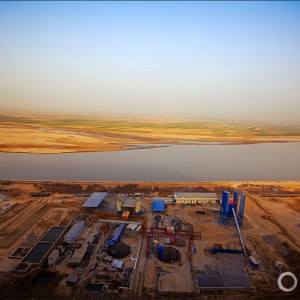James Workman: Boycott World Water Day!
Set aside warm and fuzzy emotion, and use cold logic to revalue our matrix of life.
In case your email isn’t already loaded with 967 well-meaning reminders, the United Nations has officially designated March 22 as a time for us all “to focus attention on the importance of freshwater and to advocate for its sustainable management.”
In that spirit—as one who has invested two decades into conserving this precious resource 364 days a year—let me advocate how you can truly honor our supreme liquid asset, the matrix of life, the wet stuff on which we depend: boycott World Water Day.
That’s right. Skip the political speeches, ignore the tired propaganda, bypass the grim statistics, and avoid the marches expressing solidarity and concern.
Instead, do what I plan to do. Hose down your sidewalk. Plant a lawn. Order a Big Mac (1,000 gallons to produce). Buy a new pair of jeans (2,900 gallons to make). Take a long shower. Flush your toilet a few extra times, and put off fixing that leaky sink. And, in that most sinister act of betrayal, brush your teeth while leaving the tap on.
No, I haven’t come unhinged. I recognize more than ever the serious risk we all face from depleting aquifers and draining rivers. I know I’m wasting our finite resource.
So where’s the method behind my deliberate madness? I now realize that World Water Day does more than soften or hide the impact of water depletion. It makes matters worse.
- First, it creates the illusion that we value water, when all economic indicators show we clearly do not.
- Second, it punishes the very people who strive to be frugal and green, while rewarding profligates.
- Third, it reinforces a rigged and perverse centralized system, a vertically integrated absolute monopoly of disincentives that ensures water conservation remains increasingly unsustainable.
You can stop reading right now. You can take part in the annual, feeble “celebration of water.” Or you can face reality in the water world and decide to change it.
If you, like me, decide to boycott World Water Day, you will essentially be taking the red pill that Morpheus offers Neo in The Matrix. You will see the truth behind your local water works. That is to say, you will be exposed to the Three Paradoxes of Water.
Like Adam Smith—godfather of the dismal science and author of economics’ Holy Scripture, the Wealth of Nations—you will shiver at the implications upon grasping the Paradox of Value: that water is invaluable in its use, yet worthless in exchange. In other worlds, the one substance that keeps all things alive is, literally and figuratively, priceless.
Like William Stanley Jevons—1865 author of the ‘rebound effect’ in the field of energy—you will be horrified to discover the Paradox of Efficiency: that the spread of urban and rural water saving programs, methods, and devices actually lead to increased overall consumption.
Finally, like Charles Darrow—U.S. Depression-era inventor of the world’s most popular board game—you will shudder at how it is possible to invest in and buy or sell every single asset in your life except the absolute natural Monopoly that determines every aspect of your life. You can put a house or hotel on Boardwalk, but not on Water Works. You can only pay rent, controlled by a fixed ceiling. In real life, 53,000 U.S. utilities depend on us to rent more artificially cheap water rates in order to break even. The Paradox of Monopoly is that conserving water destroys an institution’s revenue base; so to avoid a ‘death spiral,’ a water district must punish conservation, while encouraging and rewarding waste.
Not a pretty picture, is it? I bet right now you wish you’d taken the blue pill, and returned to the easy, safe, and reassuring former outlook. You long to recover the easy answers and soft solutions offered by World Water Day. You miss the images of smiling children, splashing in the wet stuff, holding hands and singing, “Water is life!”
Too late. Welcome to stark reality. Happily, though, a brave, new world is in sight—a world of personal responsibility and natural restoration—and it is not far away.
By boycotting World Water Day, you will create a local disturbance. You will provoke questions in others. You will generate real discussions about who really owns the matrix of life, and how much water we can own, and whether we should have the right and ability to save and trade what we don’t use with others in our system for a price we voluntarily negotiate.
Only by doing so can we ensure water has real value in exchange to match its value in use. Only then can we return efficiency gains back to the natural world. Only then can be unlock virtual markets within natural monopolies.
Only then can we vanquish forever the crippling and perverse Three Paradoxes of Water. At that point we won’t need an external World Water Day reminding us to value our liquid asset.
We’ll intrinsically and emphatically treasure it 365 days a year.
James Workman
Read excerpts from Workman’s book on Circle of Blue.












Well I will admit I do mention world water day and actually blog about it on my water blog to remind people of their obligation to not forget what we face the other 364 days of the year and to get active. It can also be an opportunity if used the right way.
I have made the same point for Ocean Day (June 8), arguing that until we understand that EVERY day is world ocean/water day we will be conveniently concentrating our concern and energy on a very small contribution to the much larger global need for public awareness and citizen action. I like the Monopoly analogy, equating water with electricity as a “utility,” not a commodity that has been curiously exempted from true market pricing (other than share price of corporations trading among themselves water rights and distribution schemes). Thanks.
I agree with you. But I’m also thinking that it’s not bad at all if people start to think about the importance of water on “the world water day” because than they will hopefully continue during all the year. We have to think that generally there is a lack of information, a lack of knowledge of water and all its related problems. There are still people thinking water is an infinitive source or that they have more right than others on it.
We have to work hard to exchange data and to spread knowledge of water issues.